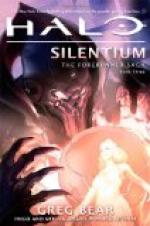“How do you know that I mean to learn to play the violin?” he queried, drooping the outer corners of his eyelids in quick suspicion, “I did not say so.”
“I know. And when you have learned, remember me. And never let anything—come here that I may put my hand on your head that you do not forget—never let anything—duty, pleasure, money, or—or a woman—come between you and your music.”
The boy stared seriously into the strange face bent over him, the face from which so much that was bad seemed for the moment to have been swept away by the luminousness of the idea that had come to the half-idiotic brain.
“‘Duty, pleasure, money or—’”
“Or a woman” cried the fiddler, his face contorting with anger. “God curse them all!” Muttering and frowning he jerked at his dog. “Come, Papillon, come; we must be getting on, it is late. Petit chien jaune, petit chien jaune.”
The dog trotting discreetly at the end of the taut lead, the old man slouched up the road, brandishing his violin aimlessly and talking aloud as he went.
“I ask myself,” said the little Norman, “how he knew.”
Then, for he was no longer in haste, he stepped into his green sabots and started homeward, biting into the apple that had listened.
PART ONE
CHAPTER ONE
The Earl of Kingsmead lay flat on his stomach on the warm, short grass by the carp-pond, and studied therein the ponderous manoeuvres of an ancient fish, believed by the people thereabouts to be something over two hundred years old. Carp had a great charm for Lord Kingsmead; so had electricity; so had toads; so had buns, and stable-boys, and pianolas, and armour, and curates, and chocolates.
Everything was full of interest to this interesting nobleman, and the most beautiful part of it was that there was beyond Kingsmead and the very restricted area of London that he had hitherto been allowed to investigate, a whole world full of things strange, undreamed-of, delightful, and, best of all, dangerous, to the study of which he meant to dedicate every second of the time that spread between that moment as he lay on the grass and the horrid hour when he should be carried to the family vault surrounded by sobbing relations.
For Tommy Kingsmead was one of those most unusual persons who understand the value of life as it dribbles through their fingers in seconds, instead of, like most people, losing the vibrant present in a useless (because invariably miscalculated) study of the future.
This morning he had devoted to a keen investigation of several matters of palpitating interest.
Had Fledge, the butler, who had apparently been at Kingsmead since the beginning of the world, any teeth, or did his flexible, long lips hide only gums? Until that day the problem had never suggested itself to Fledge’s master, but when it did, it roused in him a passion of curiosity that had to be satisfied, after the failure of a series of diplomatic attempts by the putting of a plain question.




